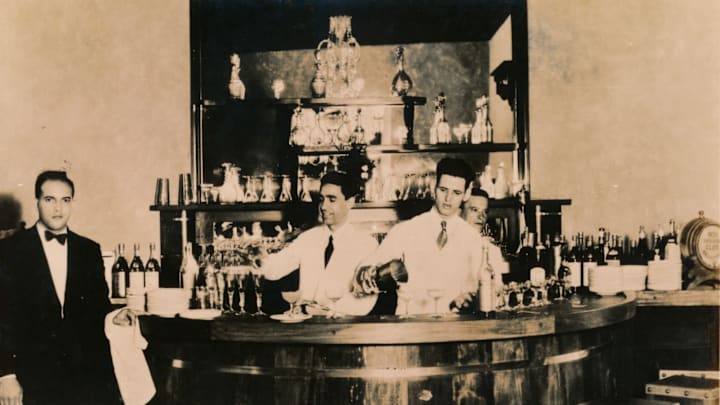Some word origins just make sense. Movies are called movies because they are moving images. Automobile comes from the French for “self” and “mobile,” because that’s what cars do.
So, what about cocktail?
It’s a word we use all the time for delightful alcoholic creations. But it doesn’t look like… Well, any part of that word. And a cock’s tail is an entirely different thing, the appendage of a farm animal. You’re not going to farms and drinking chicken tails. Right? I assume?
So where did the word cocktail come from? The answer is actually far more difficult to pin down than you might expect. In fact, trying to sift through the origin of the word cocktail might make you feel as wobbly and drunk as any liquor mixture.
The first printed instance of the word was March 20, 1798, in the London Morning Post and Gazetteer - though it’s unclear whether the article in question is referring to an actual cocktail when it uses the word, versus just making a joke about the Prime Minister. On April 28, 1803, The Farmer’s Cabinet in Vermont referred to a cocktail as “good for the head.” And then on May 13, 1806, the editor of the Balance and Columbian Repository in Hudson, New York, defined a cocktail as, “Cock-tail, then in a stimulating liquor, composed of spirits of any kind, sugar, water, and bitters it is vulgarly called a bittered sling..."
Basically what he’s describing there is an Old Fashioned. Hey, another name that makes sense, because it was one of the earliest known cocktails! It’s old-fashioned!
Regardless, that out of the way, none of those sources are the origin of the word cocktail – though May 13 is celebrated as “Cocktail Day” because that’s when the official definition is set.
So since we don’t know really where cocktail comes from, let’s get into several theories about where the word might come from.
Theory #1: Cocktail is a reference to a racehorse’s tail

Most dictionaries agree: the first use of the word cocktail can be traced back to about 1781. But not in reference to a drink, but to a racehorse’s tail. Specifically, the dictionary definition defines it as a portmanteau of “cock” and “tail” as you can imagine, which was used to refer to male chicken’s tail.
However, it was also used to refer to anything that looked like a rooster’s tail, and in particular a horse with a “docked” tail. Meaning, the owners would cut the horse’s tail super short so it looked like a little poof. By the late 1700s, horses entered into races were mostly thoroughbreds, and any horse with a “cocked tail” was remarked upon as very different from the others.
And that’s how we got the word cocktail!
Okay, just kidding, but the possible A to B here on this one makes about as much sense. One theory holds that these horses seemed friskier, which is how you feel when you have a cocktail. So mixed drinks got the name cocktail off of this. Another is since the horses were not thoroughbreds, they were adulterated, or mixed, like a mixed drink. And a third is that people would say that a mixed drink would “cock your tail up” like a horse and that got shortened to cocktail.
Look, there are plenty of weird derivations of words out there, and I’m no professional etymologist, but this explanation only makes sense if you posit the person who came up with it was very drunk on cocktails.
Theory #2: Peychaud invented cocktails because of an egg cup
You might know the name Peychaud from “Peychaud’s Bitters,” an essential part of a Sazerac among other cocktails. They were invented by Antoine Amédée Peychaud, a Creole apothecary who was based in the French quarter of New Orleans.
He created his bitters some time between 1849 and 1857, and reports vary but he either served brandy and his bitters in an egg cup or mixed everything in an egg cup. Either way, an egg cup in French is a coquetier, which, as the legend goes, was changed in English to cocktail.
This also may not be true, but seems far more likely – an early cocktail innovator invented the word cocktail based on a French word that was anglicized – than people looked at horse’s tails and thought “This looks like my drink.”
Theory #3: It’s the dregs, man
Here’s another likely suspect… Way back in the day, taps were called “cocks,” probably for non-chicken-related reasons that I’ll leave to you to figure out. As the story goes, at the end of the day the dregs from the bottom of the barrels were all mixed together and sold as the cock’s tails, or as other reports go, called “cock-tailing.”
Again, I would argue that this derivation makes a lot of sense; though historical records as far as I researched are scant in actually supporting this theory. There are a lot of ifs there, in terms of whether the spouts were called cocks at all, and the dregs were called tails, etc, etc.
There are a number of other theories about the origin of the word cocktail, including they’re named after a Mexican princess named Xochitl, an American innkeeper named Betsy Flanagan used stolen chicken tails to garnish drinks during the American Revolution, and in West Africa a scorpion is called kaketal and has a real sting to it just like cocktails.
But whatever the origin of the word cocktail, we know one thing: they’re delicious. And don’t look like horse’s tails.
Got questions about history, trivia, or anything else? Send an email to askeverest@fansided.com and we might answer here on the site!
